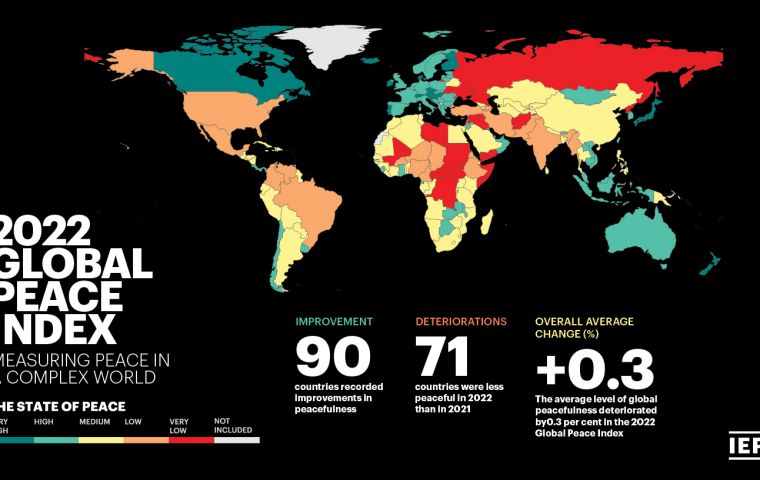MercoPress. South Atlantic News Agency
Global Peace Index for 2021 shows worsening signs
 The political and economic consequences “will reverberate for years to come,” Killelea explained
The political and economic consequences “will reverberate for years to come,” Killelea explained Coupled with deterioration in the world's economy, the Global Peace Index (GPI) for the year 2021 has been reported to have fallen 0.3% on average to reach its lowest level in 15 years, the Institute for Economics & Peace (IEP) announced this week.
It became the eleventh deterioration in peacefulness in the last fifteen years. While the situation in 90 countries had improved, which happens at a slower pace, it had also taken a fast turn for the worse in 71 nations, the IEP explained.
The 16th edition of the annual Global Peace Index (GPI) report published Wednesday also reveals that the rise in costs has increased food insecurity and political instability globally, with Africa, South Asia, and the Middle East under the greatest threat.
Political terror and insecurity, neighboring country relations, and the situation of refugees reached their worst score since the inception of the GPI, the report further revealed.
Iceland remains the most peaceful country, a position it has held since 2008, with New Zealand, Ireland, Denmark, and Austria among the top five, while Afghanistan remained the least peaceful country in the world for the fifth consecutive year, followed by Yemen, Syria, Russia, and South Sudan. Seven of the ten countries at the top of the GPI are in Europe, while Türkiye was the only nation in the region outside the top half of the Index.
Two of the five countries with the largest deterioration in peacefulness were Russia and Ukraine, they were joined by Guinea, Burkina Faso, and Haiti, due to ongoing conflicts.
Of the 23 indicators in the GPI, the largest deteriorations were recorded in neighboring country relations, the intensity of internal conflict, refugees, and political terror and instability. Twenty-eight countries have high levels of instability, and ten countries recorded the worst possible political terror score.
Since 2008, the 25 least peaceful countries deteriorated on average by 16%, while the 25 most peaceful countries improved by 5.1%. Since 2008, 116 countries have reduced their homicide rate.
For the ten countries most affected by violence, the average economic impact was tantamount to 34% of their GDP, compared to 3.6% in the less violent countries.
There were substantial improvements in several indicators, including terrorism impact, nuclear and heavy weapons, deaths from internal conflict, military expenditure, incarceration rates, and perceptions of criminality. Terrorism impact is at its lowest level since the inception of the GPI.
“Last year we warned about the economic fallout from COVID-19. We are now experiencing supply chain shortages, rising inflation, and food insecurity that have been compounded by the tragic events in Ukraine. The political and economic consequences of this will reverberate for years to come,“ explained the Australian Steve Killelea, founder & executive chairman of IEP.
“When combined with the record poor scores for neighboring relations, political insecurity, and the intensity of internal conflict, governments, organizations, and leaders must harness the power of peace,” he added.
“The economic value of lost peace reached record levels in 2021. There is a need to reverse this trend, and the GPI has shown that those countries that implement the attitudes, institutions, and structures that create and sustain peaceful societies, witness an improved economic outcome,” he went on.
The GPI measures the relative position of nations' and regions' peacefulness throughout 163 independent states and territories which collectively account for 99.7% of the world's population. The Index was first launched in May 2009 by Killelea, with endorsement from individuals such as former UN Secretary-General Kofi Annan, the Dalai Lama, Archbishop Desmond Tutu, former President of Finland and 2008 Nobel Peace Prize laureate Martti Ahtisaari, Nobel laureate Muhammad Yunus, economist Jeffrey Sachs, former Irish President Mary Robinson, former Deputy Secretary-General of the United Nations Jan Eliasson and former United States President Jimmy Carter.




Top Comments
Disclaimer & comment rulesCommenting for this story is now closed.
If you have a Facebook account, become a fan and comment on our Facebook Page!